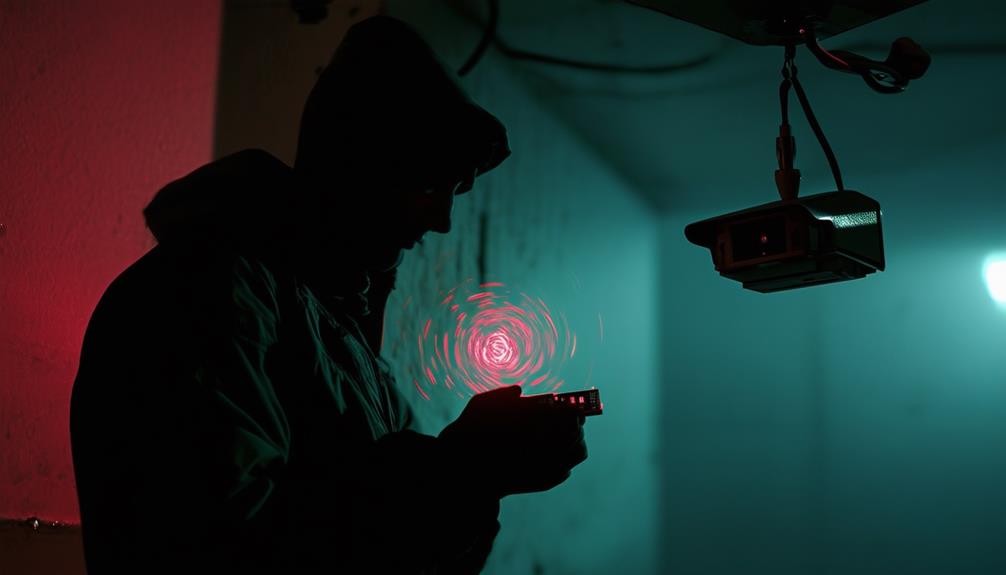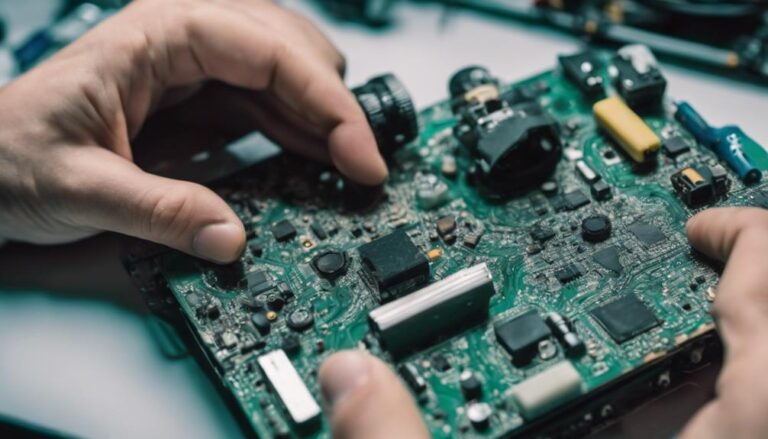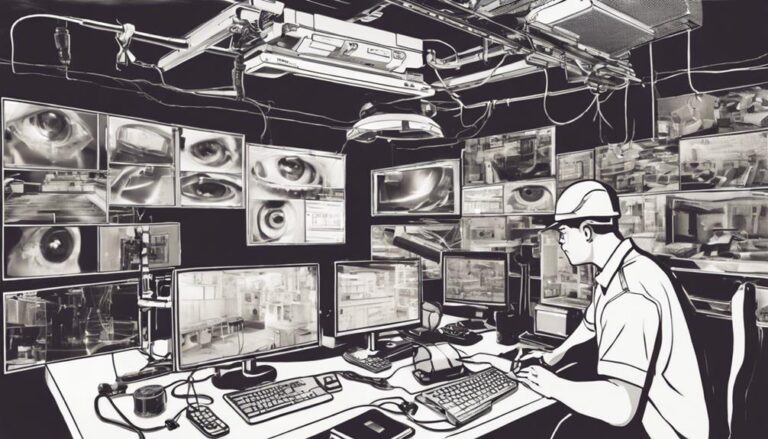Jamming a security camera can be tempting, but it's important to know that it's illegal in many places and carries heavy penalties. While you could try methods like obstructing the view or using bright lights, these tactics come with legal and ethical risks. You might face fines, charges, or even be liable for damages. Plus, tampering with cameras raises privacy concerns and undermines community safety. If you're feeling frustrated about surveillance, there are safer and legal alternatives you might want to evaluate that respect both your privacy and the rights of others. Exploring those options could be worthwhile.
Understanding Security Camera Technology
To grasp how to jam a security camera, you first need to understand the technology behind these devices. Security cameras primarily rely on two types of systems: analog and digital. Analog cameras transmit video signals through coaxial cables, while digital cameras often use IP networks to send data over the internet. Both systems have unique vulnerabilities that can be exploited if you know what to look for.
Most modern security cameras come equipped with wireless capabilities, allowing them to connect to Wi-Fi networks. This feature can be both a blessing and a curse. Wireless signals can be intercepted or disrupted with the right tools, making it easier to jam them. You'll often find that the cameras use specific frequencies, like 2.4 GHz or 5 GHz, which are commonly used by many devices, including Wi-Fi routers. Understanding these frequencies is essential in figuring out how to disrupt their operations.
Another key aspect of security camera technology is their power source. Many cameras are powered by electricity, while others use batteries. If a camera runs out of power or is unplugged, it'll stop recording. Knowing how these cameras are designed to function gives you insight into their weaknesses.
Ultimately, the more you know about the technology behind security cameras, the better equipped you'll be to understand how to interfere with their operation. This knowledge can empower you when seeking to maintain your privacy and autonomy in an increasingly monitored world.
Legal Implications of Jamming
Understanding the technology behind security cameras can shed light on the serious legal implications of jamming them. While you might feel a sense of freedom in wanting to disrupt surveillance, it's important to recognize that jamming is illegal in many jurisdictions. Most countries, including the United States, have strict regulations against the use of jamming devices. The Federal Communications Commission (FCC) explicitly prohibits the use of any equipment that interferes with authorized communications, including security systems.
If you choose to engage in jamming, you could face hefty fines and even criminal charges. It's not just about the act itself; it's about the potential consequences. Interfering with security cameras can be considered a violation of privacy laws as well. You might be disrupting a system designed to protect personal property or public safety, which could lead to civil liability if someone decides to pursue legal action against you.
Moreover, jamming can inadvertently affect other devices that rely on the same frequencies, creating broader implications. You might find yourself in a legal quagmire you never intended to enter. So, while the desire for freedom and privacy is understandable, being aware of the legal landscape surrounding jamming is vital. Weighing your options carefully can save you from significant repercussions and help you navigate the complexities of privacy and technology responsibly. Stay informed, and consider the potential risks before acting impulsively.
Common Methods of Disruption
If you're curious about how people disrupt security cameras, there are several common methods employed. These techniques often aim to obscure the camera's view or interfere with its operation, giving individuals a sense of freedom from surveillance. Here are some popular methods:
- Obstruction: Placing physical objects in front of the camera can effectively block its view. This could be anything from a simple piece of cardboard to a more elaborate setup.
- Light interference: Using bright lights or lasers aimed directly at the camera can create glare or wash out the image, making it difficult for the camera to capture anything useful.
- Signal jamming: Some folks use devices that emit signals on the same frequency as the camera's transmission, disrupting its ability to send or receive data. This method can be particularly effective with wireless cameras.
- Covering the lens: A straightforward but effective approach is to simply cover the lens with tape or a cloth. This method is quick and doesn't require any special tools.
While these methods may seem appealing for those who value their privacy, it's vital to weigh the implications of such actions. Disruption might provide a temporary sense of freedom, but understanding the broader context and potential consequences is essential. Always consider your actions and the environment around you before deciding to interfere with surveillance systems.
Risks of Tampering With Cameras
Tampering with security cameras can lead to serious legal consequences that you might not have considered. Beyond the legal ramifications, there are also ethical implications that come into play when you disrupt surveillance intended to protect people and property. It's essential to weigh these risks before deciding to interfere with any security system.
Legal Consequences Involved
Jamming a security camera might seem like a quick fix for privacy concerns, but the legal risks can really stack up. If you think you're just being clever, you might want to reconsider. Tampering with surveillance devices is often illegal and can lead to serious consequences.
Here are a few potential legal repercussions you could face:
- Criminal Charges: Depending on local laws, you could be charged with a misdemeanor or even a felony.
- Fines: You might end up paying hefty fines that can really hit your wallet.
- Civil Lawsuits: Victims of your actions could sue you for damages, leading to even more financial strain.
- Record: A conviction could leave you with a criminal record, affecting job opportunities and personal freedoms.
These risks show that while it might feel empowering to take control, the fallout can be significant. Instead of resorting to jamming, consider other ways to address privacy concerns that won't land you in hot water. It's always better to seek solutions that respect both your rights and the rights of others.
Ethical Implications Explored
Three main ethical implications arise when you consider tampering with security cameras: privacy, trust, and community safety. First, think about privacy. While you might feel justified in obstructing surveillance, it can infringe on others' rights to privacy. Your actions could expose innocent people to risks they never signed up for.
Next is trust. Communities rely on these cameras for security and safety. By jamming cameras, you erode that trust, creating a sense of vulnerability among neighbors. People need to feel secure in their environments, and your interference can shatter that sense of safety.
Lastly, consider community safety. Security cameras often deter crime and help law enforcement investigate incidents. When you disrupt this system, you may inadvertently encourage criminal behavior, putting everyone at risk. While the desire for freedom is paramount, it shouldn't come at the expense of others' safety and security.
Ultimately, before you decide to tamper with security cameras, weigh the consequences of your actions. The balance between personal freedom and collective responsibility is delicate, and your choices can have far-reaching effects on your community. Act wisely, and think about the bigger picture.
Alternatives to Jamming
When considering ways to bypass security cameras, it's essential to explore alternatives that don't involve jamming. There are various methods you could use to maintain your freedom without resorting to disruptive tactics. Here are some options that might resonate with you:
- Disguise Yourself: Wearing clothing or accessories that alter your appearance can help you go unnoticed. Think hats, masks, or even different styles that break your usual look.
- Timing is Key: If you can anticipate when the cameras will be monitoring, you can plan your actions around those schedules. Knowing the peak hours for surveillance can offer you more leeway.
- Use Natural Cover: Positioning yourself behind trees, walls, or other objects can obscure your visibility to cameras. Leverage your environment to your advantage.
- Create Diversions: Sometimes, setting off an unrelated distraction can draw attention away from you. A loud noise or sudden movement elsewhere can offer a temporary reprieve.
These alternatives not only provide you with means to bypass surveillance but also allow you to navigate your surroundings with a sense of agency. It's about finding clever ways to maintain your freedom while being mindful of the existing systems in place. Remember, it's always better to choose methods that align with your values and intentions, fostering a sense of empowerment rather than conflict.
Ethical Considerations
When you consider jamming a security camera, it's essential to think about the legal implications and how it might infringe on privacy rights. Many jurisdictions have strict laws against such actions, making it important to understand the consequences you could face. Ethical concerns also arise, as you might be compromising not just your own safety but that of others as well.
Legal Implications of Jamming
In the domain of security measures, the legal implications of jamming a security camera can't be overlooked. You might think you're asserting your freedom, but the law sees it differently. Jamming devices can be illegal under various regulations, and understanding the potential consequences is essential if you're considering this route.
Here are some key legal points to keep in mind:
- Federal Laws: In many countries, using jamming devices is prohibited by law, as they can interfere with legitimate communications.
- Penalties: Getting caught with a jammer can lead to hefty fines or even jail time, depending on the severity of the offense.
- Impact on Others: Jamming doesn't just affect the intended target; it can disrupt nearby devices, which could put you in legal hot water.
- Civil Liability: You may also face civil suits from affected parties, especially if your actions lead to damages or loss.
In short, while the desire for freedom is understandable, the potential legal ramifications of jamming can have lasting consequences. Always weigh the risks before taking action.
Privacy Rights and Ethics
While understanding the legal implications of jamming is important, the ethical considerations surrounding privacy rights also play a significant role. You might feel justified in wanting to protect your privacy, but you must weigh the potential consequences of your actions. Respecting others' rights is essential, even when you're fighting for your own.
Here's a quick comparison of privacy rights versus ethical concerns:
| Aspect | Privacy Rights | Ethical Concerns |
|---|---|---|
| Personal Freedom | Everyone has a right to privacy | Actions affecting others matter |
| Intent | Protecting personal space | Justifying methods is key |
| Consequences | Legal repercussions can arise | Moral implications must be considered |
When considering jamming a security camera, ask yourself: Is your freedom worth infringing on someone else's rights? You might argue that surveillance is invasive, but retaliatory actions can lead to a cycle of conflict. Ultimately, advocating for your privacy should be done thoughtfully, ensuring that your pursuit of freedom doesn't compromise the rights of others.
Impact on Privacy Rights
Jamming a security camera raises significant concerns about privacy rights. While some might argue that it's a way to reclaim personal space and freedom, it's vital to understand the broader implications. When you disrupt these cameras, you're not just affecting surveillance; you're challenging the balance between safety and privacy.
Consider these points regarding the impact on privacy rights:
- Public Safety: Security cameras often help deter crime. Jamming them could create an environment where illegal activities flourish, eroding public safety.
- Community Trust: Many communities rely on surveillance for shared safety. Disabling cameras might undermine trust between residents and law enforcement.
- Legal Repercussions: Tampering with security devices can lead to serious legal consequences. You might find yourself on the wrong side of the law, which could affect your freedoms.
- Chilling Effect: The knowledge that you can jam cameras might lead to a false sense of security, prompting reckless behavior that could jeopardize your privacy even further.
While you might feel justified in your actions, consider the broader context. The fight for privacy rights is complex, and jamming cameras can have unintended consequences, impacting not just your freedom but that of others around you. It's important to weigh the benefits against the risks and think about how your choices could influence the future of privacy in your community. After all, true freedom is about finding a balance that respects everyone's rights.
Future of Surveillance Technology
The future of surveillance technology promises to reshape how we interact with our environments and each other. As these advancements unfold, it is crucial to reflect on their implications on our freedoms. With AI-driven cameras, facial recognition, and even drones flying overhead, the landscape of surveillance is rapidly evolving. While these technologies can enhance security, they can also infringe on personal privacy and autonomy.
Here's a look at the potential benefits and downsides of future surveillance technologies:
| Aspect | Benefits | Drawbacks |
|---|---|---|
| Safety | Increased crime prevention and response | Over-policing and excessive monitoring |
| Efficiency | Streamlined security processes | Loss of anonymity |
| Data Utilization | Better resource allocation | Misuse of collected data |
| Public Awareness | Heightened awareness of surroundings | Erosion of trust in public spaces |
As you navigate this evolving landscape, it is imperative to stay informed. You'll want to advocate for transparency in how these technologies are used. Engaging in discussions about regulation and ethical use can empower you and your community. Embrace the technology that enhances safety while pushing back against invasions of privacy. The future is yours to shape—let's guarantee it aligns with our fundamental rights to freedom and autonomy. Your voice matters in this critical conversation.
Frequently Asked Questions
Can Jamming Devices Be Purchased Legally Online?
You might wonder if jamming devices can be legally bought online. In many places, purchasing or using these devices is illegal due to their potential to disrupt communication. Laws vary by country and even state, so it's essential to check local regulations. While some may try to find loopholes, it's best to stay informed and avoid legal trouble. Embracing freedom means understanding the boundaries that come with it, not pushing against them recklessly.
How Effective Are Common Household Items for Jamming Cameras?
When it comes to jamming cameras, common household items aren't particularly effective. You might think things like aluminum foil or spray paint could work, but they often fall short. Most cameras have advanced technology that can easily counteract these methods. Instead, focusing on legitimate privacy measures is a better approach. Remember, respecting boundaries while seeking freedom is essential, and there are plenty of legal ways to maintain your privacy without resorting to jamming.
What Are the Signs That a Camera Has Been Jammed?
When it comes to signs that a camera's been jammed, you might notice flickering footage or a sudden loss of signal. You could also see that the camera's indicator light is off or flashing erratically. If the recording appears to skip moments or shows static, that's another clear sign. Pay attention to any unusual behavior, as these could all indicate something's interfering with the camera's normal function. Stay aware!
Is It Possible to Jam Indoor vs. Outdoor Cameras Differently?
Yes, you can jam indoor and outdoor cameras differently. Indoor cameras often have a more confined range, so a smaller, focused device might work well. Outdoor cameras, on the other hand, usually cover a broader area and may require a more powerful signal to disrupt. Each environment presents unique challenges, so you'll need to evaluate factors like distance, obstacles, and camera technology. Ultimately, your approach will depend on the specific situation you're facing.
What Frequency Do Most Security Cameras Operate On?
Most security cameras operate on frequencies around 2.4 GHz or 5 GHz, similar to Wi-Fi networks. It's worth mentioning that over 75% of wireless cameras use the 2.4 GHz band, which can lead to congestion. If you're looking for more freedom in your space, understanding these frequencies can empower you. By knowing how these devices communicate, you can better navigate your environment, whether for privacy or exploring your options.



